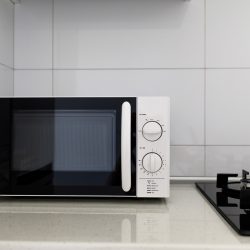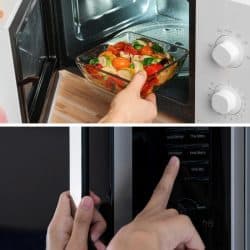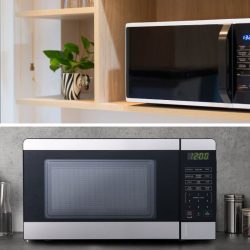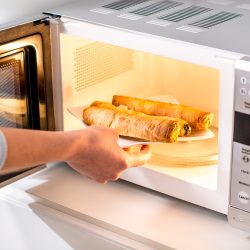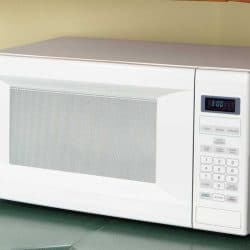Getting to know all of the appliances and gadgets in your kitchen can feel endless. Are you shopping for a microwave or microwave oven but don't know if they are the same? What is the difference, if any, between the two? Luckily, we have the answers to these pressing questions below. Let's discuss!
Although they may have different names, microwaves and microwave ovens are the same. Microwave is short for 'microwave oven,' so that is the full term for our favorite little kitchen device.
Moreover, a microwave has its name because it uses microwave radiation to heat food, so that's something to remember while shopping.
As we begin, we will cover all things microwaves and discuss why they have various names. Whether it's time to upgrade your existing appliance or you are curious, we're here to offer some insight. With that said, let's dive head-first into this topic!
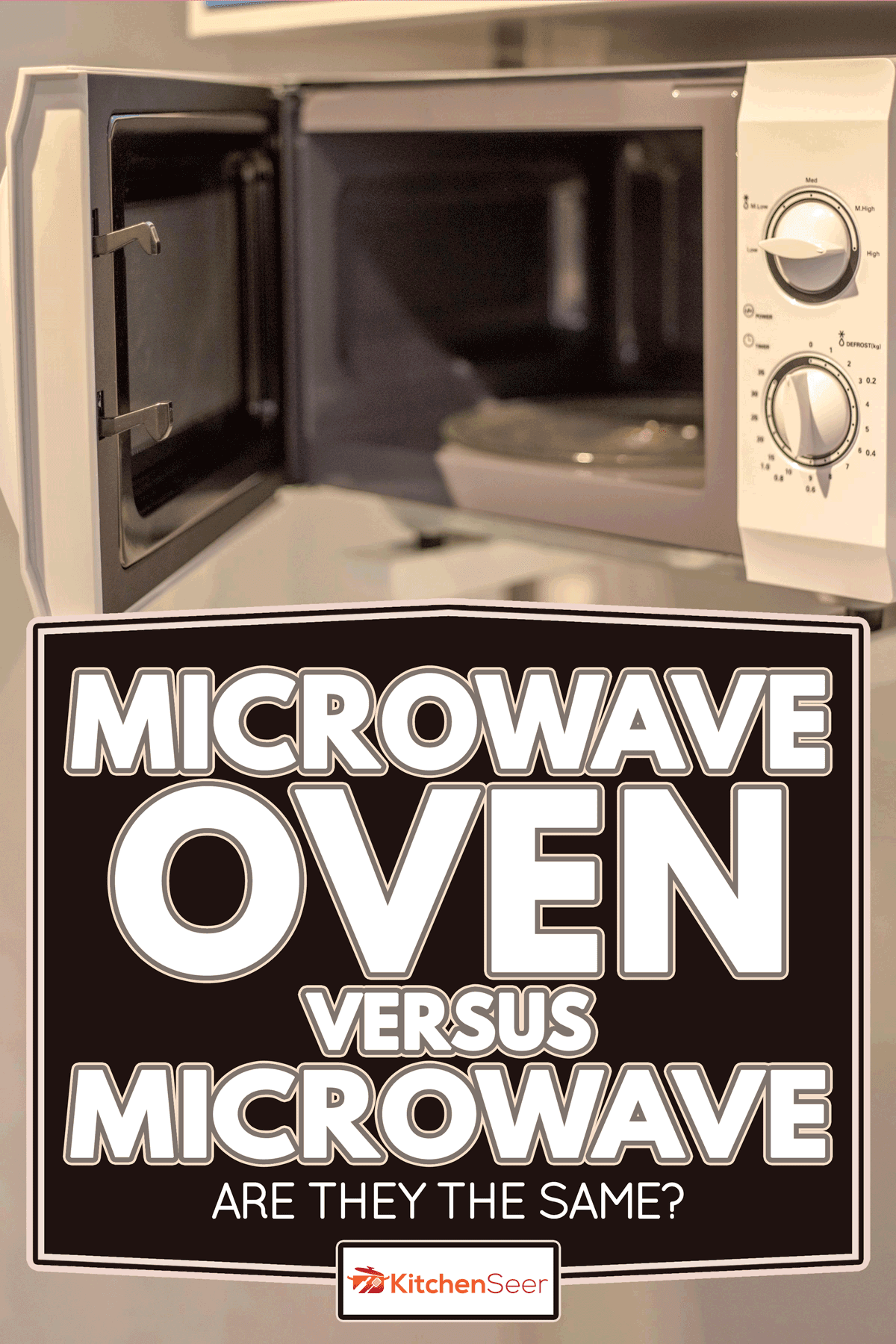
Is A Microwave Oven A Microwave?
Yes! A microwave oven is the same as a typical microwave appliance. As we said, both of these devices use microwave radiation to heat food and liquids, hence the name.
Typically, brands advertise microwaves as microwave ovens, although they serve the same purpose. However, microwave ovens may have a few extra features than standard, budget-friendly microwaves, but we digress.
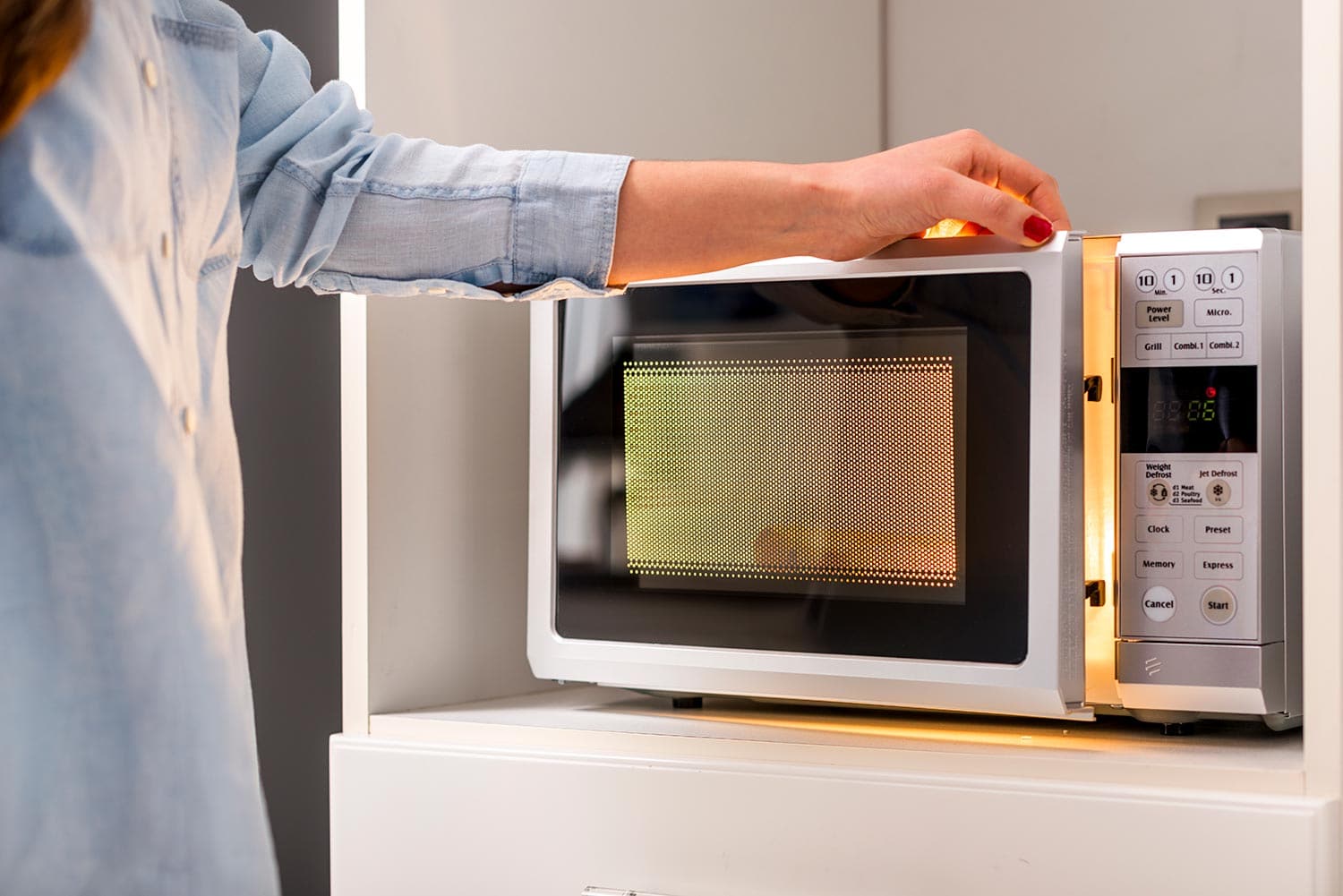
Many people confuse microwave ovens and toaster ovens, which are different. Again, whenever you see the term microwave, you know it will be a mini-oven that uses radiation.
With so many different designs and technological advances, it can be confusing to know exactly what every appliance does, so read your microwave's description/instructions when in doubt.
You may find that it has a hidden feature that can make your life even easier.
What Is The Difference Between A Microwave And An Oven?
The main difference between a microwave and a traditional oven is how they heat your food. Microwaves use super-fast electromagnetic waves (radiation) to warm your meals, making them the quicker option.
On the other hand, ovens use heating coils, which heat up and warm the oven air. So think of this as one permeates your food through intense radiation while the other warms it from the air/atmosphere.
When it comes to which one is more efficient, we would say a microwave is faster, although it won't always cook your food as well as the oven.
That can make a difference in flavor, consistency, and overall appearance, so you don't want to cook Thanksgiving turkey in your microwave.
It's also common to have a lesser flavor in the microwave for certain meals, like meat and fish, so the oven tends to be better for those.
Of course, if you need to reheat pizza or cook popcorn quickly, the microwave is better, but we recommend the oven for actual meals.
Can You Cook Anything In A Microwave?
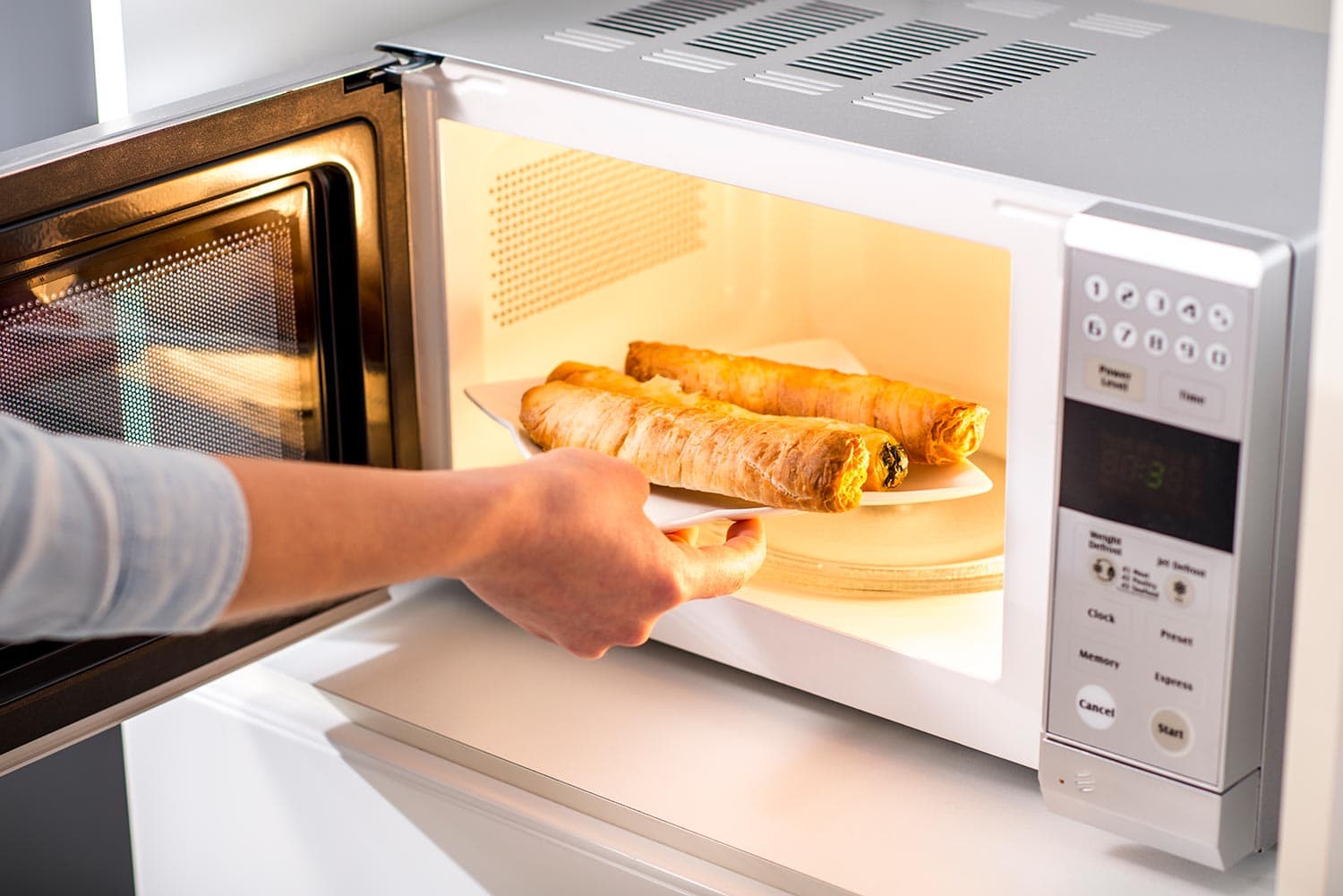
As long as the packaging for your food is microwave-safe, it will be fine in the microwave. Generally, preparing frozen meals is what many people use the microwave for, among various items.
For example, many brands will use radiation-safe packaging, which can safely be heated quickly inside your appliance. As we said above, the microwave isn't always ideal for all meals, so that's something to remember.
Let's say you want to make baked chicken for dinner. If you place your chicken on a plate in the microwave for the required time, you may still end up with a subpar meal.
That is because the microwave doesn't evenly heat food as an oven does. Typically, microwaves heat the side of your food that faces upwards the best while sometimes leaving the bottom side frozen/uncooked.
That can become a major issue for meat, so we suggest using the oven. Even though this will take a bit longer, it's worth it for taste and overall consistency.
When it comes to what dishes can go into the microwave, glass and ceramic are usually safe, even if they don't specifically mention it.
What Can't You Put In The Microwave?
Now that you know most food can go into the microwave, it's essential to understand what can't go in. Usually, you want to avoid placing the following items into a microwave or microwave oven:
- Aluminum foil
- Paper bags/products
- Plastic bags/containers
- Lidless containers
- Travel mugs
- Styrofoam
- Takeout boxes
For food:
- Whole eggs
- Processed meats
- Red pasta sauce
- Hot peppers
- Breast milk
- Grapes
Again, not all containers and packaging is made equally. You may have luck with some brands and food while not such luck with others, so make sure to follow the item's heating instructions.
For example, if you want to reheat something wrapped in aluminum foil, remove the wrapping and place the item onto a microwave-safe plate.
Failing to do so can result in a fire, becoming super dangerous. Although microwaves and microwave ovens are convenient, they can quickly become a fire hazard.
Does Food Cook Well In A Microwave Oven?
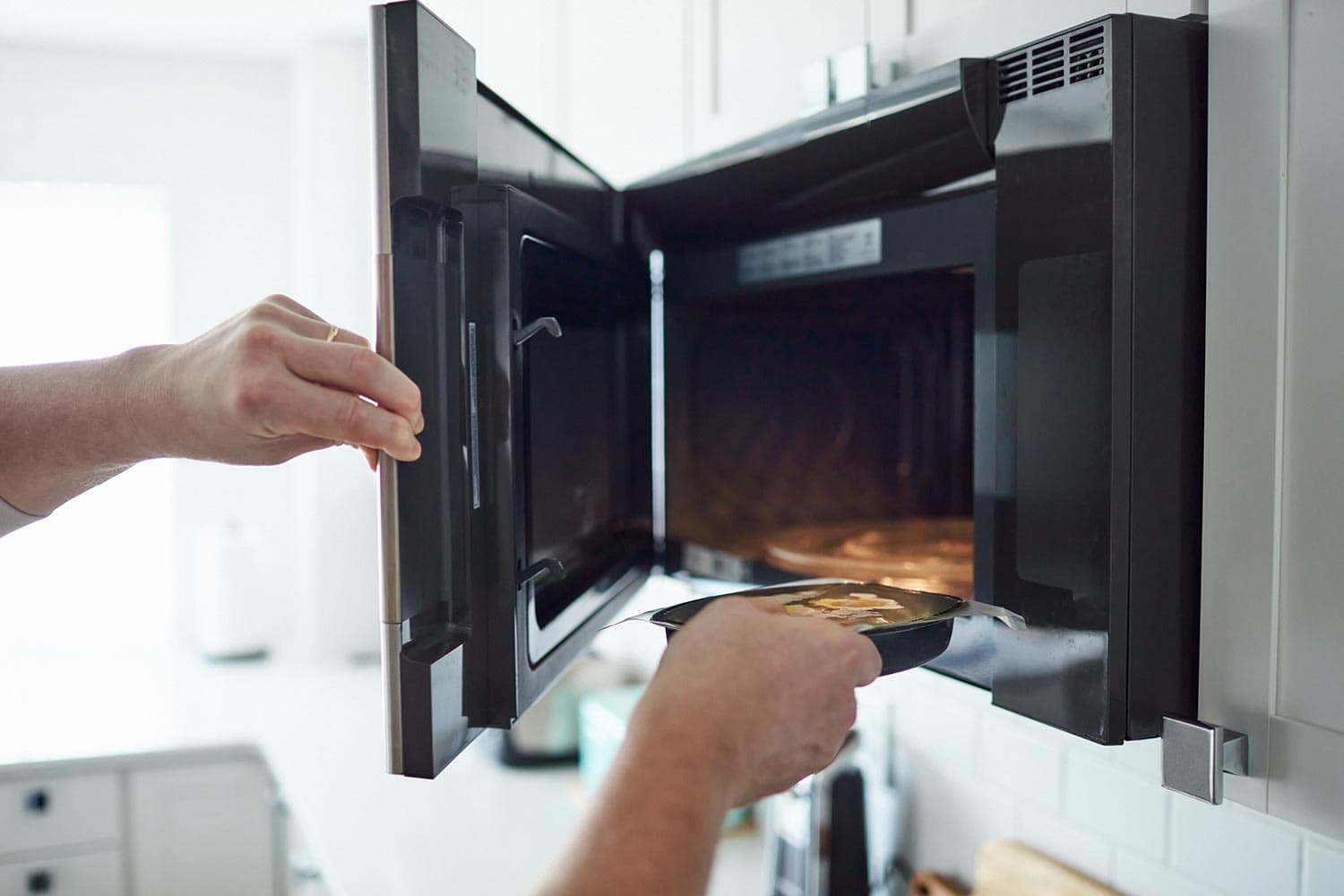
In general, food will cook well inside the microwave. Considering your microwave's fast cooking ability prevents your meal from burning or charring.
Furthermore, food in the microwave tends to retain more nutrients, as they aren't destroyed due to prolonged cooking. That can make a huge difference for protein and other important food benefits, so the microwave wins this round.
On the other hand, your microwave may not always cook food evenly. As we mentioned, it's common to see one side of your food be hot and ready to eat, while the bottom layer needs more cook time.
Luckily, this is an easy fix. All you have to do is flip or rotate your food, turn the microwave on for a few minutes, and you're done!
One of the many reasons people love microwaves is that they are easy for any chef to use. Whether you love making intricate recipes or prefer boxed pasta, the microwave is a streamlined, convenient option.
Again, you may prefer the traditional oven process instead, so that's not to say the microwave is always the superior appliance.
Is Using The Microwave More Efficient?
Yes, using a microwave is more efficient than traditional heating options. According to Precision Nutrition, a microwave has roughly 57% heating efficiency, while the oven falls between 9-17%.
Microwaves heat food from the inside out, while ovens do the opposite, which may be one reason for this efficiency. The oven takes longer to prepare food because it works through hot air, while your microwave uses high-frequency radiation.
With that said, not everyone is comfortable with the radiation levels in a typical microwave oven, which is understandable. Sometimes, the fastest option isn't always the best for our long-term health.
Is Using The Microwave Safe?
Although some may believe the microwave is toxic, this isn't true. According to the World Health Organization, if you use a microwave correctly, it doesn't pose much risk to you.
Considering that the amount of radiation cooking your food isn't regarded as unsafe by professionals, you shouldn't need to worry about turning on your appliance.
However, some question the legitimacy of these claims because a microwave can become unsafe if you use the wrong containers inside it. For example, it has been researched whether heating food in plastic can trigger hormone disruption.
There are also claims that the microwave can take away the nutrients in your food, although this isn't generally as bad as the oven. Again, there will be a few setbacks with modern technology, so you win some, you lose some.
It's always best to check the containers and food you put into the microwave to ensure they are 100% microwave-safe.
Can My Microwave Make Me Sick?
No, it isn't common for a microwave to make you sick. Even if your appliance is old and has a leak, the radiation shouldn't cause you to feel ill.
Taste Of Home claims that a faulty or aging microwave won't produce nearly enough non-ionizing radiation to make you sick, which is reassuring.
Furthermore, not cooking food in a microwave oven long enough can cause issues.
For example, if you make meat, you want to ensure it reaches the correct internal temperature (usually around 175 degrees) or you risk getting a foodborne illness.
That can become rather serious if you undercook your food a lot, so keep that in mind. Some newer microwave models offer various heat/power settings, which can be helpful in this situation.
How Long Does A Microwave Last?
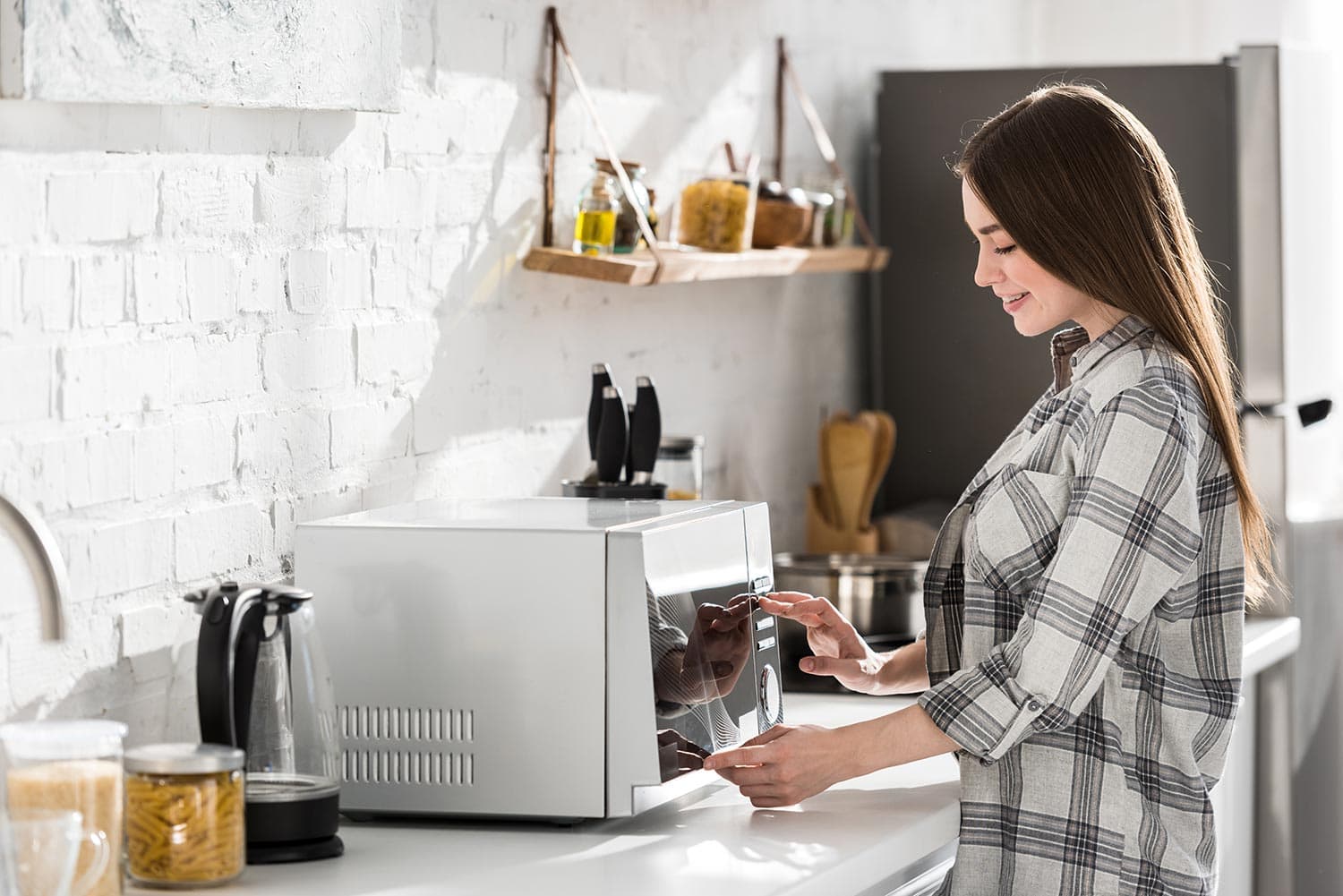
You can typically expect a microwave to last 5-7 years with regular use. However, if multiple people use the appliance and nobody takes care of it, you could only see one last two or three years.
Like any kitchen appliance/device, you need to maintain a microwave. For example, regularly cleaning out its vents if they are clogged is an easy way to keep one running for years to come.
Additionally, you want only to place microwave-safe items and food inside. As we mentioned, not following proper protocol can result in a severe fire.
Not only will that ruin your microwave, but it could set your entire house on fire.
To Finish
Whether you love using the microwave or don't yet own one, it's always good to know what it does. We found that a microwave and a microwave oven are the same.
Considering that anything with a microwave title uses radiation to cook food, that's an easy indicator. Moreover, a microwave will be smaller than a traditional oven and has a faster cooking time.
Regardless, you want to follow the heating instructions for your appliance and clean it regularly, so it lasts as long as possible.
Made it to the end? Check out these helpful related kitchen posts below!
Convection Microwave Vs. Microwave: Which To Choose?
Why Is My Microwave Sparking With No Metal Inside?
Microwave Runs But Not Heating Up - What To Do?

